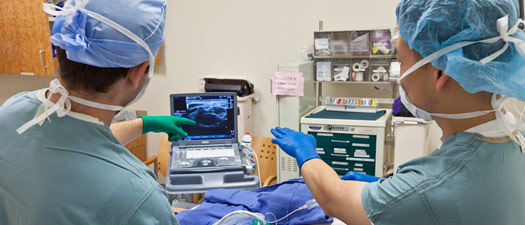Regional Anesthesiology and Acute Pain Medicine Fellowship

The Regional Anesthesiology and Acute Pain Medicine Fellowship provides advanced postgraduate training in regional anesthesia techniques and acute pain management skills.
Fellows will be immersed in a comprehensive curriculum to gain mastery of ultrasound-guided nerve blocks and catheters, peripheral nerve blocks and nerve stimulation techniques.
Program Overview and Curriculum
Fellows will develop the knowledge and skills to provide basic, intermediate and advanced regional anesthetic techniques for a diverse patient population at UCI Medical Center - a major referral center and the region’s only Level I adult and Level II pediatric trauma center and Regional Burn Center. With a combination of clinical experience and structured education, fellows will become leaders in the field of regional anesthesiology and acute pain medicine.
Fellows will have the opportunity to rotate in community-based hospital settings to increase their experience in pediatric regional anesthesia and acute pain management that complements the training provided at UCI School of Medicine. Rotations are offered at Kaiser Permanente Baldwin Park Medical Center.
Fellows will receive broad hands-on training in single injection and continuous peripheral nerve blocks as well as neuraxial anesthesia and analgesia. While ultrasound-guided techniques are emphasized, nerve stimulation techniques are also incorporated into the training experience. Fellows can also expect to gain extensive experience in performing and managing thoracic epidurals, including patient-controlled epidural analgesia, as part of our comprehensive approach to acute pain management.
Fellows will participate in structured didactics that consists of:
- Problem-Based Learning Discussions (PBLDs)
- Journal Club
- Grand rounds
- Workshops
- Hands-on live model workships
Formal educational sessions are constructed to provide an overview of regional anesthesiology and acute pain medicine topics. Fellows will take an active role as an educator to residents and will develop educator techniques that will enhance the learning experience for the trainees.
Fellows are strongly encouraged to participate in scholarly activities and participate in quality improvement projects within the institution. There is ample opportunity for fellows to attend regional and national conferences and are encouraged to submit abstracts and present cases. Under the mentorship of subspecialty faculty, previous fellows have presented projects at national meetings. Fellows may have the opportunity, depending on availability, to participate in the Global Outreach Initiative with UCI faculty members to medically help underserved areas of the world.
Clinical Experience
Fellows will be clinically assigned to cases in the operating room as an attending anesthesiologist. As a clinical instructor, fellows will gain experience as an independent anesthesiologist by providing anesthetic care to a diverse group of patients as well as the opportunity to supervise and teach residents and medically direct CRNAs in a team-based setting.
During training, fellows will be under the supervision of an attending faculty while on the acute pain and regional anesthesiology services.
Acute Pain Service (APS)
The Acute Pain Service at UCI Medical Center has a high volume of cases and a large variety of regional nerve blocks. Fellows will be an integral member of the APS team where they will gain valuable leadership skills to coordinate a team-based patient care approach and learn the management of acute pain. Fellows will help lead patient rounds to manage continuous peripheral nerve block catheters and thoracic epidurals, as well as to provide acute pain consultations for management of postoperative, cancer and trauma-related pain.
Regional Anesthesia Service
The Regional Anesthesia Service provides regional anesthesia to a diverse patient population at dedicated preoperative block areas. The preoperative block areas are each equipped with the capacity for full monitoring and allowing sterile procedures to be performed preoperatively, maximizing patient safety and minimizing disruption to the flow of operating rooms. Fellows will also perform regional blocks at the outpatient surgery center in the general preoperative area. Each site is equipped with dedicated ultrasound machines with a variety of transducers for superficial to deep nerve blocks.
Fellowship Graduates
2022-2023
Juliann Cho, MD
Benjamin Kuo, MD
Marian Mikhael, MD
Shagun Mohan, MD
2020-2021
Isabel Chang, MD
Jeanne Hunter, DO
Simon Kim, MD
Daniel Park, MD
2019-2020
Sarah Giafaglione, MD
Staci Becker, MD
Wei Yun (Dorothy) Wang, MD
2018-2019
Anna Bowling, MD
Monica Breaux, MD
Corey Tong, MD
2017-2018
Claire Kaura, MD
Angeline Nguyen, MD
Shawn Thomas, MD
2016-2017
Mustafa Ali, MD
Sophonie Noel, MD
Trevor A. Whitwell, MD
2015-2016
Vimal Desai, MD
Hao Ho, MD
Michael Moffitt, MD
2014-2015
Diana Diaz, MD
2013-2014
Martin Vogel, MD
2012-2013
Christie Brown-Munoz, MD
2011-2012
Nishant Shah, MD
2010-2011
Ariel M. Hurtado, MD
How to apply
Applicants must apply through the SF Match using the Central Application Service (CAS). The 2024 application cycle begins December 15, 2023. All interviews will be held in January through April and will be conducted via Zoom.
Special Requirements
Applicants must have completed an ACGME accredited anesthesiology residency program and have a DEA license and California medical license prior to start of fellowship.
The fellowship program participates in a nationwide best practice to ease the transition from residency to fellowship with an August 1 start date.
Contact Information
For questions about the fellowship program, contact the Fellowship Coordinator.
Rogelio (Roger) Hernandez
Fellowship Coordinator
anesthfellowship@hs.uci.edu
Sarah Giafaglione, MD
Program Director
Explore Our Division



